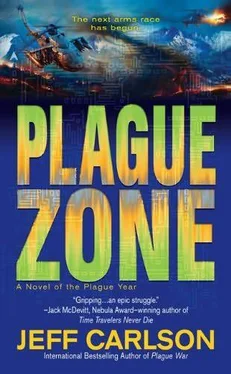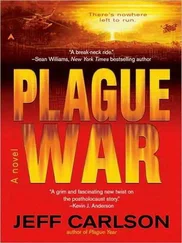His first useful command had been to redirect their planes into Russian territory, where the air fields were free for the taking. This decision seemed even more farsighted when he learned that a second wave of Chinese ICBMs blasted Montana and the Dakotas, destroying the last of the American silos. He’d preserved their air strength, which otherwise might have suffered further casualties in the missile strikes. Then he set patrols above California again.
There were two counter-attacks. Three F/A-18s flew out of Flagstaff and knocked down five Chinese fighters before falling themselves. A single V-22 Osprey rose out of Colorado and, using Chinese codes, pierced deep into California before it was shot down, too. There were also several American planes that ran for the East Coast or overseas. They were pursued and killed. Perhaps a few escaped.
The fight was won, but the cost had been too steep. Jia was even rightly to blame, not a scapegoat, and honor demanded that the men who’d set the war in motion take responsibility for their losses. Qin would assume command of this base — that much was obvious.
I was glad to serve, Jia thought as he drew his sidearm and presented the weapon to Qin, grip first. With the same motion, he also bowed.
“Twenty minutes ago, our nanotech labs failed to check in on schedule,” Qin said, surprising him.
“Sir?”
“Perhaps their radio failed,” Qin said. “Their buildings might have fallen in an aftershock. Or there may be a larger problem. We need to be sure.”
There may be weaponized nanotech drifting from the site, Jia thought, completing the fear that Qin left unmentioned.
“I considered diverting my helicopter,” Qin said, “but my mission here is critical and we were only seven men including our pilot. I believe you’ve gathered a second helicopter at this base, correct?”
“Yes, sir.”
Before the plague year, the PLA had begun a major new initiative to increase their helicopter fleet. Even so, they’d lagged far behind more modern armies. Only a handful of Z-9 and Z-10 birds came with their invasion force, and they lacked enough pilots to fully take advantage of the helicopters they’d gained in the war. A functioning, crewed helicopter was priceless, but earlier today Jia had ordered one of the very few aircraft in the region to himself in hope of salvaging more electronics from other bases. They’d seen limited success, yet this decision also seemed well fated, so he risked a question.
“Are the nanotech labs nearby?”
“They’re less than an hour from this base — in San Bernadino, against the mountains,” Qin said.
This information had been kept from Jia. He’d only seen reports on the scientists’ progress, but he understood why he’d been closer to the program than he’d guessed. There had been quarantine protocols in case of disaster. He was inside those lines. Before the missiles fell, he would have been able to reach the labs if necessary.
“We may bomb the site,” Qin said. “I want you to lead a strike team to the labs first. Secure our research and our people there, too. Prove yourself again. There are some who want to strip you of your commission, but you are essential to the MSS and we always take care of our own.”
Jia’s pulse quickened at the inflection in Qin’s words. We. Something had been nagging at Jia since they met, but he’d been too upset to realize it. Now the older man grazed the back of Jia’s hand with his fingertips. The gesture was fleeting. Qin’s hand was already gone, but there was a watchful light in his eyes, and no Chinese officer would have touched another like this in normal conversation.
Qin Cho was homosexual, too.
The realization went through Jia like clean sky breaking through the ash. He knows my secret, Jia thought. He shares it! Then, even more startlingly, He could have me if he wanted. He owns me. And I him.
Jia’s pulse quickened. Qin was not unattractive. His authority more than compensated for his stout, older body, as did the experience in his eyes. The danger was its own forbidden thrill. Jia could barely imagine a time or a place to share the other man’s bed, but the prospect was unforgettable.
He’d long worried that his superiors knew of his sexuality and were ready to use it against him. What if their plan was even more layered than he’d guessed? If his attacks failed, they could use his deviancy to condemn him — but if he succeeded, they would be certain that the lead officer was one of their own.
There are more of us in hiding! Jia thought. At least, he wanted to believe Qin wasn’t the only one like him, because he could barely contain his excitement.
Did their curse supersede their other loyalties? Probably not. But it might create a phantom power bloc within the Ministry of State Security. The most hawkish elements of the MSS had risen to leadership. A few men in key positions could affect the fate of a nation, and homosexuals would be driven by the deepest motivation to succeed as well as the greater goals of China. They were also less likely to be constrained by concern for any wives or children.
What if their shame and their pride were ultimately responsible for the aggression that led to the war? Or the development of the mind plague itself? Could they hope to use nanotech to rewire themselves and become normal hetero males someday? Was that even possible?
If Jia had been reported when he was young, that information must have been intercepted and suppressed by someone who was always looking for more recruits. Then they’d watched him. Jia couldn’t evaluate how high their control might be felt. Qin had been a senior general even before the missiles fell, and he wouldn’t have come into the quarantine zone himself if he were the topmost surviving member of their brotherhood.
Jia yearned for more power for himself. Recognition. Acceptance. Even if it was in secret, to be welcomed by people who shared his stigma was irresistible.
This is how he seduces me, Jia thought. They would be like lovers. Whether they literally pleasured each other or not was almost beside the point. It was the hateful truth that committed them.
“I am honored, sir,” Jia said. “Thank you, sir.”
“Then you understand?”
“I believe I do, sir. Yes, sir.”
Qin had studied Jia’s face as he worked through his real izations in a flurry, watching every perceivable shock and emotion. He must have felt the same when they approached him, Jia thought. How long had the cabal existed? Years? The notion made his head swim. He felt as if he’d found himself on a ladder above a vast pit. One misstep would kill him — but there was also an exhilarating sense of attachment. Some day perhaps he would be looking down at another man, helping him up, too.
Jia grinned, but the older man’s face darkened as if rejecting him. Did he think the grin was flirtatious? A ploy?
Did I mean it that way? Jia wondered.
“You know there was an American flight into California four hours ago,” Qin said.
“Yes, sir. We shot it down, sir.”
“They were using Second Department codes. The timing seems suspicious. The detachment guarding the labs is not unsubstantial. A full platoon of Black Tigers resided with the science teams. They were also equipped with two helicopters of their own. If their radios failed, why haven’t either of those helicopters come for help?”
“The American plane was destroyed, sir.”
“What if there were more? Could the Americans have slipped another aircraft through your lines?”
“Yes, sir.” Jia was formal now. He’d seen his mistake. His relationship with Bu Xiaowen had suffered from the same quandary, which was precisely why homosexuality was outlawed by the PLA. Favoritism was a weakness. So was forced submission and the resentment that might come with rape. If the cabal was as well entrenched as Jia hoped, they must be even stricter in demanding a hands-off policy among themselves. It was a schizophrenic but vital law, denying their very nature. Were there exceptions? Covert liaisons? There must be. But at what penalty?
Читать дальше












